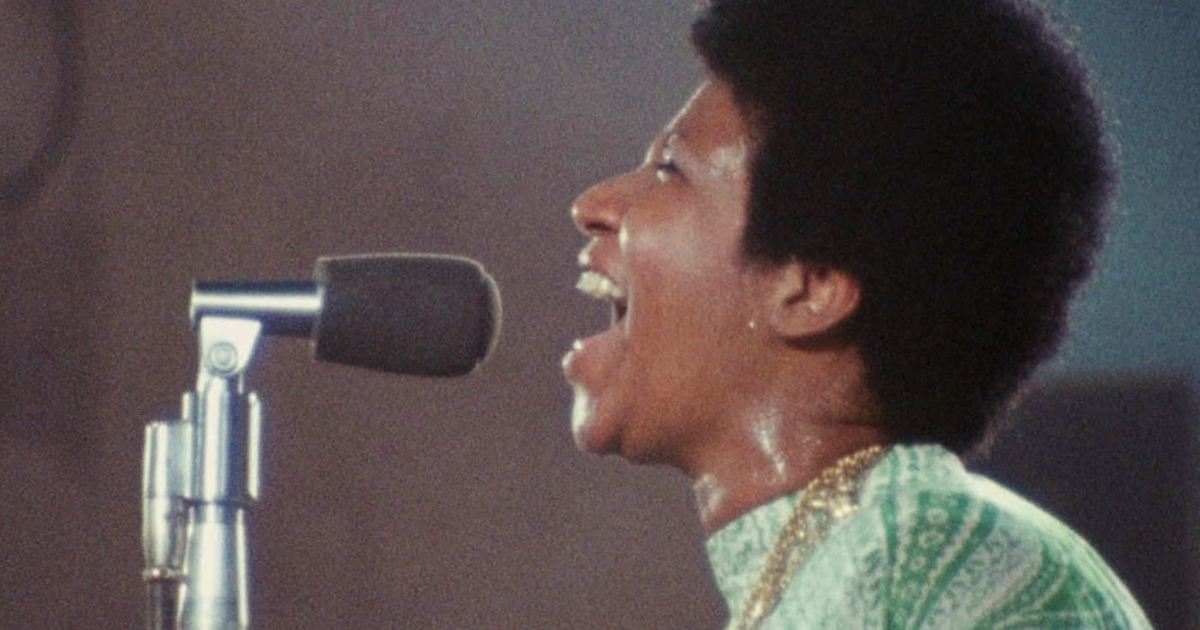Image on Facebook for Art of Sense Amazing Grace Sign

With the rare exception, the "concert movie" has been little more than the hour-long filler y'all find in between episodes of Antiques Roadshow on PBS or as y'all look for the next wrestling program on AXS TV (no? Only me? Okay). Shot with a handful of cameras and about as much artistry every bit a petting zoo, they are fine for die-hard fans looking for a sixth-manus concert experience merely rarely do they e'er burst off-screen for those with annihilation less than an obsessive connectedness with the men and/or women on stage.
Nonetheless, with Amazing Grace comes not merely a burst of energy, simply a 90 minute commodities of lightning right to the middle.
Some 47 years in the making, Amazing Grace focuses on a youthful, endlessly energetic Aretha Franklin as, in January 1972, the performer attempts to tape what would become (and still stands every bit) the most important and influential gospel album in music history. Shot past managing director Sydney Pollack and taking place in the Watts, Los Angeles-based New Bethel Baptist Church, Amazing Grace is a thrilling, captivating historical document that stands equally both a cultural antiquity and something seemingly heaven sent. Originally intended to play opposite Super Fly on a double bill, Astonishing Grace has long been relatively impossible to see equally Franklin, for no known reason, blocked the motion-picture show from release until her untimely expiry. That'south worth pointing out for non only contextual reasons but as something to curiosity at after seeing what is maybe one of the greatest concert films always fabricated.
Somewhere in between documentaries like The Concluding Waltz and Stop Making Sense, Amazing Grace is a film unlike any other. Formally, the movie is very much in chat with documentaries of this time catamenia. With a motion picture similar Original Bandage Album: Company on the listen as of tardily, the films of D. A. Pennebaker seem to be a proper comparison point, especially in both parties interest in the moments in between the performances. Living in this world for roughly xc minutes is a thrilling experience. Pollack's camera is unwavering, capturing even the smallest of gestures or glances, or in the case of Franklin's functioning, every drop of sweat. There'south an intimacy to the film that comes primarily from the setting, which sees the New Temple Church offering upwards the perfect landscape for Franklin to explode onto vinyl and celluloid. Information technology's a smaller venue than most of the documentaries from this time period would focus on, giving it a decidedly rebellious free energy that'south relatively shocking given the gospel focus.
Information technology's likewise an astonishing time sheathing. A youthful Franklin is not an epitome we see very often on screen, and here she's at her near vital and nigh punk-ish. There's a lack of cocky-importance to each 2nd of her performance, a raw vitality that turns her gospel singing into something that comes alive through fourth dimension and infinite. Watching her in rehearsal is quite telling and ofttimes hilarious, equally her reputation equally a shy, cocky-assured performer comes across in almost annoying ways during some scenes, and seeing her in her chemical element is a document of indescribable import. Single performances similar that of "Mary, Don't You Weep" or the bewilderingly transcendental 11-infinitesimal epic rendition of the title classic stand out as well, non just for Pollack'due south charismatic filmmaking but the sheer artistry backside Franklin's singing. It'due south this performance, Franklin's youthful energy and brazen sonic experimentation, that turns this picture into something more than but a documentary or a concert flick. And more so, this fact isn't lost on those who lived in this moment. The oversupply is often front and eye here and watching as people are pushed to the point where they need to exist restrained for fright of physical harm happening upon them, it's this rapture that is truly one in a million. There will never be another Aretha and there will never be Amazing Grace.
Joshua Brunsting
Josh is a critic, a member of the Online Flick Critics Society, a wrestling nerd, a hip-hop head, a father, a cinephile and a human being looking to make his stamp on the globe, ane word at a time.
Source: https://criterioncast.com/reviews/theatrical/joshua-reviews-sydney-pollacks-amazing-grace-theatrical-review
0 Response to "Image on Facebook for Art of Sense Amazing Grace Sign"
Post a Comment